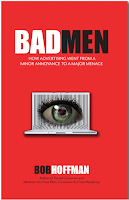No one's been tougher on Facebook than this blog (and we will continue to be tomorrow.) But we also believe in being fair.
Yesterday I must have received at least 10 emails from people linking me to a story widely reported in the ad/marketing news and blog feedback loop about Facebook. The story said that a small company found that 80% of the clicks on its Facebook ads were not real people, but were bots.
This is a very damning and dangerous claim for Facebook, and potentially all online media, if legtimate. However, we have nothing but the company's statement as evidence.
I have no reason to doubt the company's veracity, but no way to know whether their assertion is true or whether it's just a weird aberration. Before we rush to judgment, let's see what others, including Facebook, have to say about this.
August 01, 2012
Subscribe to:
Post Comments (Atom)





4 comments:
I would not be surprised
Wow - unlike that guy Felix you once had a *conversation* with about social media, you are willing to give Facebook the benefit of the doubt. Good for you.
It's a pretty damning story, if true. How will you/we be able to figure that out, do you think?
Having run several Facebook ad campaigns successfully and having to have done some deep analytics on how visitors from these campaigns behave beyond the click, I haven't had reason to suspect this is true. If it's true, it's not just true for Facebook but it's true for just about everybody.
Traditional search advertising which fulfills demand obviously behaves in ways more desirable to the advertiser, but that's why the clicks cost more. It might take me three times as many clicks from Facebook ads to elicit a visitor exhibiting the behavior of one visitor from Google Adwords, but if the clicks from Facebook cost one-third of the price, it's a horse a piece.
Frankly, there's not a lot of difference between a bot and an unqualified prospect incurring you cost as the result of a poorly targeted, poorly designed campaign. If you've been running Facebook campaigns and not tracking the results (which if the bot claim is true, you most certainly would be able to unearth) you deserve what you get.
Bob -- I have to confess I was once prone to jargon and babble, and then I read "Web Analytics 2.0" by Avinash Kaushik. It's pretty much the Moneyball of digital advertising. It is *criminally* under-read by digital marketers, probably because it's not the easiest read in the world and most of these guys have been trained to stop reading after 140 characters. I have no affiliation with this book or this guy, but if you've got the time to read it, I recommend you do so.
Neil
http://www.amazon.com/Web-Analytics-2-0-Accountability-Centricity/dp/0470529393/ref=sr_1_1?ie=UTF8&qid=1343827414&sr=8-1&keywords=Avinash+Kaushik
I think the difference between a bot and an
unqualified prospect is important.
If your marketing attracts the wrong
people, whatever that means, then you may have a chance to fix it.
What can you
do about the bots? If they exist that is.
People clearly are measuring their results from their Facebook advertising. That is the problem. They don't stack up very well. Facebook has a real issue here.
Which is why some digital marketers say the effectiveness of display ads should not be measured by clicks / being interactive etc but in the same way as as a print ad is. People see it and that's enough. The very thing they claimed wasn't engaging enough or lack interactivity etc is now all of a sudden sufficent.
So if that is true that display ads have an effect as is - what ones can you remember?
Post a Comment